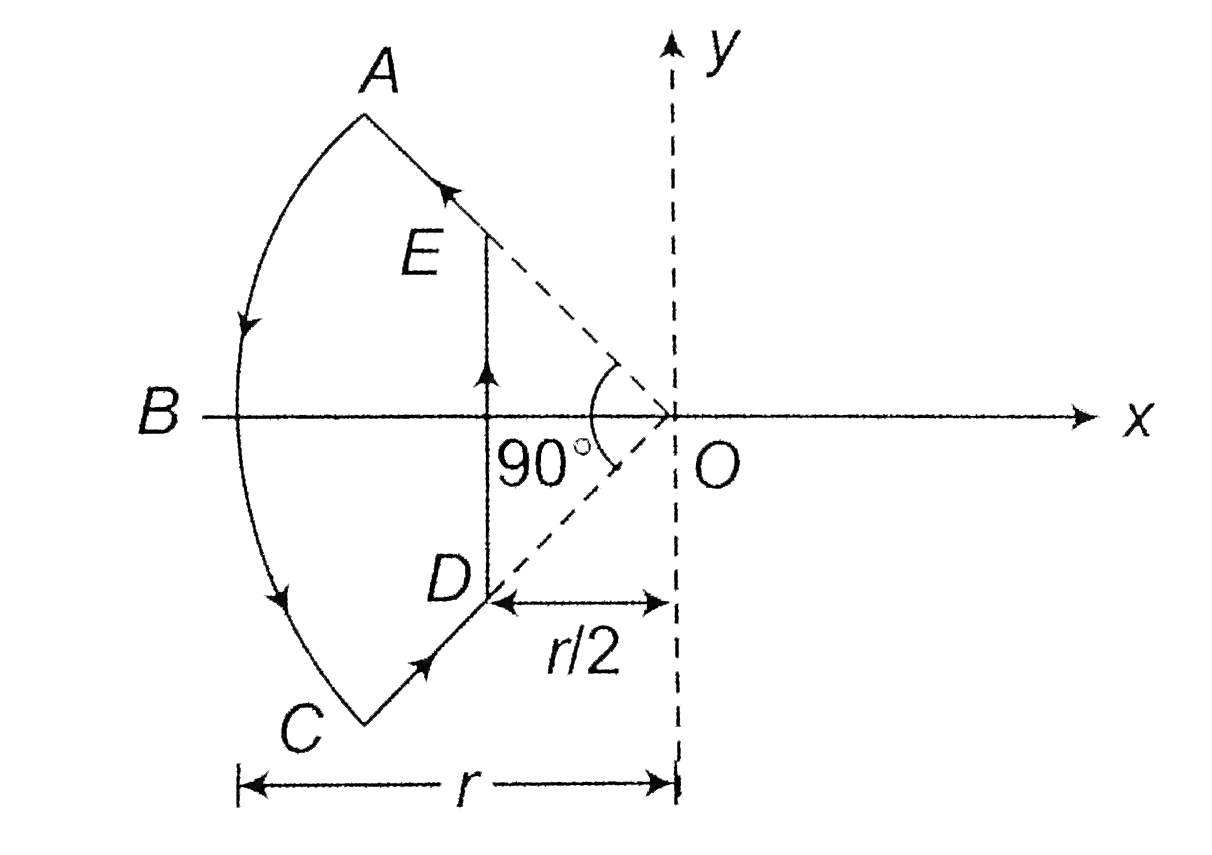A particle of mass m and charge + q is projected from origin with velocity →V=V0ˆi in a magnetic field →B=−(B0x)ˆk. Here V0 and B0 are positive constants of proper dimensions. Find the radius of curvature of the path of the particle when it reaches maximum positive x co-ordinate.
The correct Answer is:2

Magnetic force on the particle at origin is along positive y− direction, so its trajectory will be concave upwards. As the magnetic field is nonuniform, trajectory is not circular. Magnetic force is always perpendicular to velocity . So its magnitude remains constant. Let at point P(x,y) its velocity vector make an angle θ with positive x− axis . Then the magnetic force −→FB will be at angleθwith the positive y− direction . So,
ay=(FBm)cosθ(or)dυydt=(B0x)(qυ0cosθ)m
[FB=Bqυ0sin90∘] or
(dυydx).(dxdt)=(B0qxm)(υ0cosθ) where
dxdt=υx=υ0cosθ
Thusdυydx=(B0qm)x
At maximum x− displacement , velocity is along positive y− direction
or ∫υ00dυy=(B0qm)∫xmax0xdx
or υ0=(B0qm)(x2max2)
or xmax=√2mυ0B0q
Topper's Solved these Questions
- BOOK - NARAYNACHAPTER - MOVING CHARGES AND MAGNETISMEXERCISE - LEVEL-VI (SINGLE ANSWER QUESTION)81videos
MOVING CHARGES AND MAGNETISM
- BOOK - NARAYNACHAPTER - MOVING CHARGES AND MAGNETISMEXERCISE - Level =I (H.W)42videos
MOVING CHARGES AND MAGNETISM
- BOOK - NARAYNACHAPTER - MOVING CHARGES AND MAGNETISMEXERCISE - NCERT Based Questions20videos
MOVING CHARGES AND MAGNETISM
- BOOK - NARAYNACHAPTER - MAGNETISM AND MATTEREXERCISE - EXERCISE - 4 (SINGLE ANSWER TYPE QUESTION)17videos
MAGNETISM AND MATTER
- BOOK - NARAYNACHAPTER - NUCLEAR PHYSICSEXERCISE - LEVEL-II-(H.W)9videos
NUCLEAR PHYSICS
Similar Questions
A particle of charge q and mass m is projected from the origin with velocity v=v0ˆi in a non uniformj magnetic fiedl B=−B0xˆk. Here v0 and B0 are positive constants of proper dimensions. Find the maximum positive x coordinate of the particle during its motion.
View SolutionA particle of specific charge 'α' is projected from origin at t=0 with a velocity →V=V0(ˆi−ˆk) in a magnetic field →B=−B0ˆk. Then : (Mass of particle =1 unit)
View Solution
Knowledge Check
- Question 1 - Select One
A proton is fired from origin with velocity →v=v0ˆj+v0ˆk in a uniform magnetic field →B=B0ˆj.
Aits z-coordinate can never be negativeBits x-coordinate can never be negativeCits x-and z-coordinates cannot be zero at the same timeDits y-coordinate will be proportional to its time of flight - Question 2 - Select One
A particle of mass m and having a positive charge q is projected from origin with speed v0 along the positive X-axis in a magnetic field B = −B0ˆK, where B0 is a positive constant. If the particle passes through (0,y,0), then y is equal to
A−2mv0qB0Bmv0qBC−mv0qBD2mv0qB0 - Question 3 - Select One
A particle of charge per unit mass α is released from origin with a velocity →v=v0ˆi uniform magnetic field →B=−B0ˆk. If the particle passes through (0,y,0), then y is equal to
A−2v0B0αBv0B0αC2v0B0αD−v0B0α
A particle of specific charge α is projected from origin with velocity v=v0ˆi−v0ˆk in a uniform magnetic field B=−B0ˆk. Find time dependence of velocity and position of the particle.
View SolutionA wire loop ABCDE carrying a current I is placed in the x−y plane as shown in the figure. A particle of mass m and charge q is projected from origin with velocity
→V=V0√2(ˆi+ˆj)m/sec.
(a) Find the instaneous acceleration
(b) If an external magnetic field →B=B0ˆi is applied, find the force and torque acting on the loop due to this field.
 View Solution
View SolutionA charged particle (q.m) released from origin with velocity v=v0ˆi in a uniform magnetic field B=B02ˆi+√3B02ˆJ.
Maximum z-coordinate of the particle isView SolutionA portion is fired from origin with velocity →v=v0ˆj+v0ˆk in a uniform magnetic field →B=B0ˆj. In the subsequent motion of the proton
View SolutionA charged particle (q.m) released from origin with velocity v=v0ˆi in a uniform magnetic field B=B02ˆi+√3B02ˆJ.
When z-co-ordinate has its maximum valueView Solution
